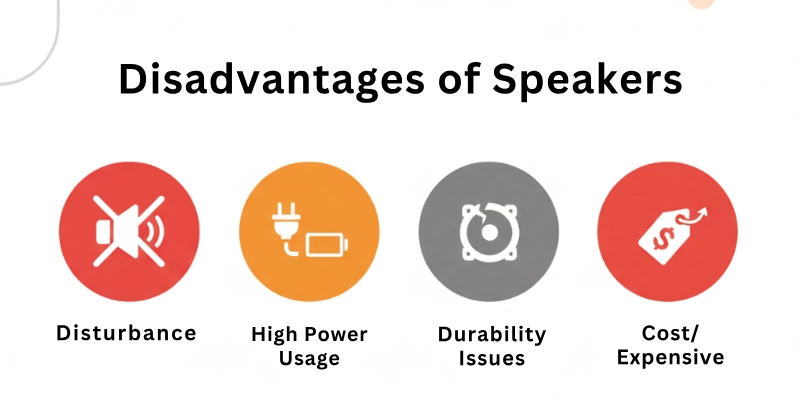Pros and Cons of Speakers: Find Best Sound for You!
Published: 2 Oct 2025
You all know what speakers are, right? In simple terms, speakers are devices that produce sound from electronic signals. If you’re here, I know you’re eager to explore the advantages and disadvantages of speakers.
So, what are you waiting for? Let’s delve into the details!
Advantages of Speakers
Speakers play a crucial role in our audio experiences. They enhance the way we hear sounds from electronic devices.

So here are the major pros of speakers:
- Improved Sound Quality
- Clear Audio Reproduction
- Convenient Connectivity Options
- Enhanced Bass and Treble Performance
- Creates a Surround Sound Experience
- Suitable for Various Audio Formats
- Durable and Long-lasting
Let’s cover all the above-mentioned benefits of using speakers in detail.
1. Improved Sound Quality
Speakers give better sound than built-in device speakers. They make music and voices louder and clearer. This helps you enjoy songs, movies, and games more. Good speakers make listening a better experience. They bring out small details in the audio. You can notice instruments and effects you may miss otherwise. This makes the sound feel rich and complete.
2. Clear Audio Reproduction
Speakers play sound in a natural way. You can hear both soft and loud parts clearly. This makes conversations, calls, and entertainment easy to follow. Clear sound also reduces strain on your ears. Even at high volume, the sound does not get distorted. This makes them great for parties or group listening. Clear sound also improves learning in online classes and meetings.
3. Convenient Connectivity Options
Modern speakers are easy to connect. You can use cables, Bluetooth, or Wi-Fi. This makes them work with many devices like phones, TVs, and computers. Connecting is quick and simple for daily use. Wireless speakers remove the mess of cables. You can also connect multiple speakers together. This makes them flexible for home and outdoor use.
4. Enhanced Bass and Treble Performance
Speakers give strong bass and sharp treble. This makes music sound full and exciting. You can feel the beats and enjoy the details. Both low and high sounds are improved. Good bass makes movies and games more powerful. Treble adds clarity to voices and instruments. Together, they create a balanced and enjoyable sound.
5. Creates a Surround Sound Experience
Some speakers can make sound come from all sides. This feels like being inside the movie or concert. Surround sound makes gaming and watching more fun. It creates a rich and immersive experience. It is perfect for home theaters. You can enjoy cinema-like sound without leaving your home. This makes family time and gatherings more enjoyable.
6. Suitable for Various Audio Formats
Speakers can play many types of audio files. They work with MP3, streaming apps, and other formats. This makes them flexible for different uses. You can enjoy all kinds of content without trouble. They support both music and video formats. Many modern speakers can even connect to smart assistants. This makes them useful for both entertainment and daily tasks.
7. Durable and Long-lasting
Good speakers are built to last for years. They are made with strong materials. With care, they keep working well without problems. This makes them a good long-term investment. They can handle regular use without damage. Some are even water-resistant for outdoor use. Investing in quality speakers saves money in the long run.
Disadvantages of Speakers
While speakers bring us the joy of music and sound, they also have some drawbacks worth considering. So here are the major cons of speakers:

- Requires Space
- Potential Noise Disturbance
- Room Acoustics Affect Sound
- Distortion at High Volumes
- Higher Power Consumption
Let us cover all the drawbacks of using speakers in detail.
1. Requires Space
Speakers often take up more room than built-in device speakers. Large floor-standing speakers need extra space in a room. Even smaller ones need shelves or stands. This can be a problem in small homes or offices. Portable speakers save space, but they may not give the same sound quality. You also need proper placement for the best sound. Managing space for speakers can sometimes be difficult.
2. Potential Noise Disturbance
Speakers play sound loudly, which can disturb others nearby. Neighbours, family members, or coworkers may find it noisy. High volume can cause complaints in shared living spaces. This makes speakers less suitable for late-night use. You may need headphones to avoid disturbing others. Volume control is important for peaceful surroundings. Using speakers responsibly helps prevent problems.
3. Room Acoustics Affect Sound
The way a room is built affects speaker sound. Hard walls, tiles, and furniture can change the audio quality. Sound may echo or become unclear in some rooms. This can reduce the listening experience. You may need to adjust speaker placement for better results. Sometimes special soundproofing or acoustic panels are needed. Not every room gives the perfect sound environment.
4. Distortion at High Volumes
When speakers are played too loudly, the sound may distort. Music and voices can lose clarity at extreme levels. This makes listening less enjoyable. Long use at high volume can also damage the speaker. Keeping the volume at safe levels prevents distortion. Quality speakers handle high volume better, but still have limits. Over time, misuse can shorten the speaker’s life.
5. Higher Power Consumption
Speakers need more power than small built-in ones. Large speakers or home theater systems consume a lot of electricity. This can increase energy bills. Portable ones use batteries that need charging often. High power use makes them less eco-friendly. Energy-efficient models can reduce this issue. Still, speakers usually require more power to deliver strong sound.
Conclusion
So guys, in this article we have covered the major pros and cons of speakers.
Personal Advice:
Using speakers can enhance your listening experience, especially when you want to enjoy music, movies, or games with high-quality sound. They are ideal for social gatherings and when you need to fill a room with sound. However, avoid using speakers in shared spaces or at night to respect others’ peace and quiet. Also, consider the space you have; large speakers may not be suitable for small rooms.
If you have any confusion, feel free to ask in the comment section. We are here to help!
FAQs
Here are the most commonly asked questions related to the advantages and disadvantages of speakers.
Speakers are devices that produce sound by converting electrical signals into audio signals. They are used in many devices like TVs, computers, and phones to let us hear music, voices, and other sounds.
There are several types of speakers, including:
- Bookshelf Speakers: Small speakers that fit on a shelf.
- Floor-standing Speakers: Large speakers that stand on the floor.
- Soundbars: Long, slim speakers often used with TVs.
- Portable Speakers: Small, wireless speakers you can carry around.
- Subwoofers: Speakers that produce deep bass sounds.
Some disadvantages of speakers include:
- Size: Larger speakers can take up a lot of space.
- Cost: High-quality speakers can be expensive.
- Power Consumption: Some speakers use a lot of electricity.
- Sound Quality: Cheap speakers may not produce good sound.
- Maintenance: Speakers can require maintenance and repairs over time.
Advantages of Sound:
- Communication: Helps us talk and understand each other.
- Entertainment: Allows us to enjoy music, movies, and games.
- Safety: Alerts us to danger, like alarms and sirens.
Disadvantages of Sound:
- Noise Pollution: Unwanted noise can be disturbing and harmful to health.
- Hearing Damage: Loud sounds can damage our hearing over time.
- Interference: Sound can interfere with concentration and communication.
Here are the major uses of speakers:
- Listening to Music: Enjoying songs and albums.
- Watching Movies and TV: Hearing dialogues and sound effects.
- Gaming: Enhancing the gaming experience with sound.
- Public Speaking: Amplifying voices in presentations or events.
- Announcements: Making important announcements in public places.
Active speakers have built-in amplifiers, which can lead to:
- Higher Cost
- Heavier Weight
- Complex Setup
- Heat Generation
Common speaker problems include:
- Distorted Sound
- No Sound
- Connectivity Issues
- Buzzing
- Physical Damage

- Be Respectful
- Stay Relevant
- Stay Positive
- True Feedback
- Encourage Discussion
- Avoid Spamming
- No Fake News
- Don't Copy-Paste
- No Personal Attacks

- Be Respectful
- Stay Relevant
- Stay Positive
- True Feedback
- Encourage Discussion
- Avoid Spamming
- No Fake News
- Don't Copy-Paste
- No Personal Attacks





